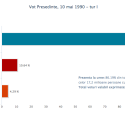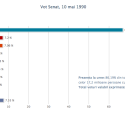IMPORTANT DEVELOPMENTS
- IMF. Romania concludes a second stand-by agreement with the IMF.
- FOREIGN POLICY. Victor Ponta’s visit to Asia signals the country’s decision to attract foreign investments.
- ECONOMY. One year after entering insolvency, Hidroelectrica returns on the market with important profits.
- ENERGY. Romania is looking for alternatives to the Nabucco project.
- ADMINISTRATION. The government enacts its policies to increase the efficiency of the central public administration.
- POLITICS. The USL expects the Constitutional Court’s written decision on the law of the referendum.
1. Romania has successfully concluded the second stand-by agreement with the IMF
The Ponta Cabinet is the first Romanian Government after the Nastase Cabinet, which manages to successfully follow an IMF agreement. The decision of the IMF board reflects not only the resolve of the USL Government, but also the important improvements in the country’s macroeconomic standing and the progresses achieved in enacting structural reforms. The inflation rate remains low, and the fiscal and current account balances remain sustainable.
Romania has a stable economy. The IMF decision is also an appreciation, according to Government representatives, of the seriousness with which Romania followed its international commitments. Government figures expressed their resolve to act in the same manner in regards to Romania’s commitments in front of the European Commission.
Romania has fulfilled all five requirements stipulated by the stand-by agreement and successfully concluding another one only days after the European Commission ended the excessive deficit procedure of Romania represents a strong positive signal for the international financial markets and for the international investors.
2. The Prime Minister’s Asian Tour – attracting strategic investments and sending a positive high-level signal
Prime Minister Victor Ponta set off on an Asian tour, that included visits to Azerbaijan, Kazakhstan and China. One of the objectives of the visits, according to Government sources, was restarting Romania’s relations with the former Soviet Republics, which were underplayed and ignored for the last decade by Romanian diplomacy.
Victor Ponta was received by both the Chinese president and the Chinese Prime Minister. The fact that the new leadership in Beijing decided to receive Victor Ponta so soon after its inauguration represents a positive signal for Romania and for the USL government.
During his visit, Victor Ponta also had a series of meetings with representatives of important Chinese companies, such as telecom giants Huawei and ZTE, which have already invested in Romania and are looking for additional investment opportunities. The Prime Minister discussed with its Chinese counterparts the project of the number 3 and number 4 reactors in the Cernavoda nuclear power plan, as well as other projects, such as the Tarnita-Lapuseni hydro plant.
According to Government figures, the main objective of the Prime Minister’s Asian tour was developing Romania’s relations with these countries, especially in terms of bilateral trade and investment, with a focus on the energy sector. The visits come after several high profile visits in Western Europe, which also point out Romania’s importance in the EU and the country’s increasing attractiveness for foreign investors.
3. Hidroelectrica’s exit from insolvency is a success of the Government’s economic policies
After almost one year, Hidroelectrica has managed to overcome the disastrous situation where the PDL cabinet had left it, returning on the market with a significant profit. Government figures expressed their satisfaction and their hopes that the reform process will be successful in other state-owned companies, such as Oltchim.
Hidroelectrica’s insolvency managed to block contracts damaging the company’s interests, which cost the Romanian state 1.4 billion Euros yearly. The Prime Minister’s Control Corps managed to uncover the problems and the culprits must now answer for their actions. Several high-profile PDL leaders, such as former minister Adriean Videanu and former state secretary, Tudor Serban were responsible for such tremendous losses incurred by the company.
The tasks awaiting the new leadership of the company are prioritizing the existing investments. Government figures emphasized that the energy sector is an utmost priority for Romania, as its development can lead the country towards economic development and energy independence.
4. The Government is looking for alternatives in the aftermath of the Nabucco’s project failure
Government figures expressed their disappointment with the recent decision taken by Azerbaijani authorities in regards to the Nabucco project. However, the prospects are not that bleak for Romania, the state with the highest degree of independence in terms of resources of all the actors involved in the project.
Government representatives emphasized that Romania committed to this project because it was seen as a relevant EU project and it supported its enactment for reasons of European solidarity. The Romanian authorities and the Romanian companies fulfilled their contractual obligation and, in spite of the reversal, Romania will continue to follow consistently the European Union’s objective of diversifying its energy supply sources.
Romania’s options (harnessing the maritime continental plateau hydrocarbon resources or inland shale gas deposits) have the potential of increasing the country’s energy independence. Government representatives emphasized that the Prime Minister’s visit to Azerbaijan is meant to develop additional energy projects.
5. The USL Government combats bureaucracy
In a drive to increase the efficiency of the central administration and to lower the costs of the administrative system, the Government decided to disband 60,000 vacant positions. Government representatives emphasized that the moves will not lead to dismissals, but will result in significant savings made to the national budget.
Government figures also emphasized that the education and the healthcare systems will not be affected by the measures, and that these policies will allow the return to a 1 on 1 hiring system (up to this moment, public institutions could only hire 1 person for every 7 disbanded positions). The move is designed to solve the problem of the lack of personnel in healthcare and education – disbanding these positions will free up resources for the two systems.
Government figures declared that the decision paves the way towards a more efficient and dynamic public bureaucracy, that will bring 45 million RON to the budget in 2013 and 108 million RON for each of the next four years.
6. The USL will debate the issue of the referendum for the approval of the revision of the Constitution
The USL leaders have emphasized that they do not wish to pass judgment upon the Constitutional Court’s recent decision in regards to the amendments brought to the law concerning the organization of referenda until the Court’s written decision is issued. The most important aspect USL leaders emphasized was that the Court rejected the PDL’s contestation in regards to the constitutional character of the new piece of legislation.
The Court ruled that lowering the turnout threshold for referenda is constitutional, but that the new provisions will only enter into force one year after the promulgation of the new law. Several high-profile legal scholars commented on the vague character of the decision and on the lack of Constitutional provisions for the Court’s imposing of a one-year time limit.
The Court’s decision impacts not only the Constitution revision process, but also on the regionalization process, whose main objective was to increase Romania’s European funds absorption starting next year. Leaders of the USL hinted to the possibility of holding the referendum for the approval of the revised form of the Constitution next year, alongside the European Parliament or presidential elections. The USL however did not adopt any formal decision on the matter.
USL leaders underlined that the revision of the Constitution remains an important project of the ruling coalition, limiting the immunity of the MPs, clarifying the institutional attributions of the president, sanctioning political migration, and introducing the new level of regional government. The leaders of the USL also emphasized that the transparent revision procedures and the consultation of civil society actors and international institutions will continue within the Romanian Parliament.









